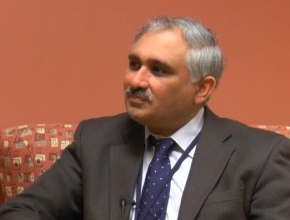Related McMaster Perspective episodes
Nair P, Jaeschke R. The future of medicine is here. Part 1: Benralizumab in asthma.Nair P, Jaeschke R. The future of medicine is here. Part 2: The basics of biologic drugs in asthma.
Nair P, Jaeschke R. The future of medicine is here. Part 3: More on the biologics in asthma.
References
Nair P, Wenzel S, Rabe KF, et al; ZONDA Trial Investigators. Oral Glucocorticoid-Sparing Effect of Benralizumab in Severe Asthma. N Engl J Med. 2017 Jun 22;376(25):2448-2458. doi: 10.1056/NEJMoa1703501. Epub 2017 May 22. PubMed PMID: 28530840.Roman Jaeschke: You told us about a number of already available [biologic] drugs these days, and you said they should be used in the most severe patients. Are there any patients’ characteristics that would direct you to choose different medications?
Parameswaran Nair: Yes. That is a very important question. This is where the future is going, this concept of using biomarkers or endotyping, using “omics” platforms, where by applying technologies such as proteomics or transcriptomics—assessing all the proteins or all the genes involved in a patient’s pathobiology in a biological sample, either in blood or in airway secretions—we would be in a few years able to identify with a fair degree of precision which would be the dominant cytokines involved in that particular patient. This is where the field is going. We may have these “omics” platforms on chips, where you could apply sputum, blood, or epithelial brushing—some sort of body secretion whereby we could identify the dominant pathobiological mechanism. And this is not science fiction. It is very likely to happen in the next 5 to 10 years.
Here in Hamilton instead of using the “omics” platform we still use simple cytometry, cell counts and sputum, which gives us a very good idea as to what is the predominant biological process that would help us to direct these treatments.
Roman Jaeschke: You told me about the future. How about today? How do we choose among them, if there is a choice?
Parameswaran Nair: We can use good clinical judgement with certain currently available clinical biomarkers. I will give you an example: If the patient is on high doses of inhaled corticosteroids and long-acting bronchodilators, you have ensured compliance, and their asthma control is still poor, and if they have a very good clinical history of allergy—not just total serum IgE or a positive skin prick test but a very good clinical history of allergy—I would use a monoclonal antibody to block IgE, which would be omalizumab.
If the patient has a very high blood eosinophil count or more preferably airway eosinophil count, such as in sputum, either spontaneous or induced, we would use an anti-interleukin (IL) 5 monoclonal antibody. You could have mepolizumab, reslizumab, or benralizumab; there is really nothing to choose between those 3 at the moment.
However, if the patient is more severe and has eosinophils and is on daily prednisone, my preference would be to use reslizumab or benralizumab over mepolizumab simply because the dose of mepolizumab currently approved for use is lower than what I would consider as the optimal dose; it is a 100 mg subcutaneous dosing, and I believe in those severe patients who are on high doses of prednisone that dose may not be very effective.
Having said that, I should mention that there has been no head-to-head comparison between any of these biologics. These are all inferences based on treatment effects and effect sizes of these phase 3 clinical trials and our own personal experience running a very large severe asthma clinic here in Hamilton.
Roman Jaeschke: Professor Nair, this is probably one of the most exciting interviews I had. I believe the future is right here. It was not a science fiction edition of McMaster Perspective. It is real and it is coming. I hope our listeners found it as exciting as I did. Thank you very much.
Parameswaran Nair: Thank you very much, Roman.
 English
English
 Español
Español
 українська
українська







